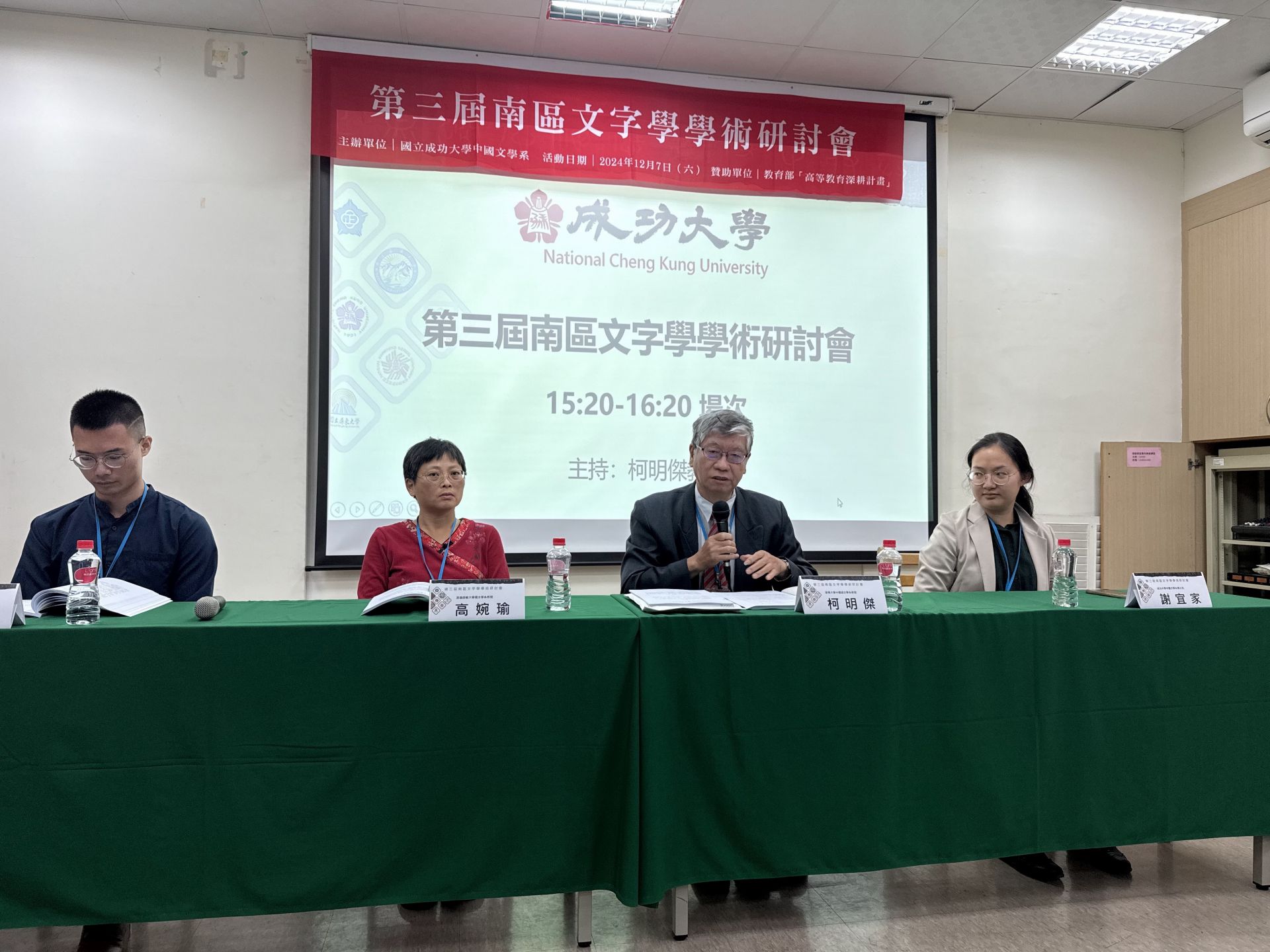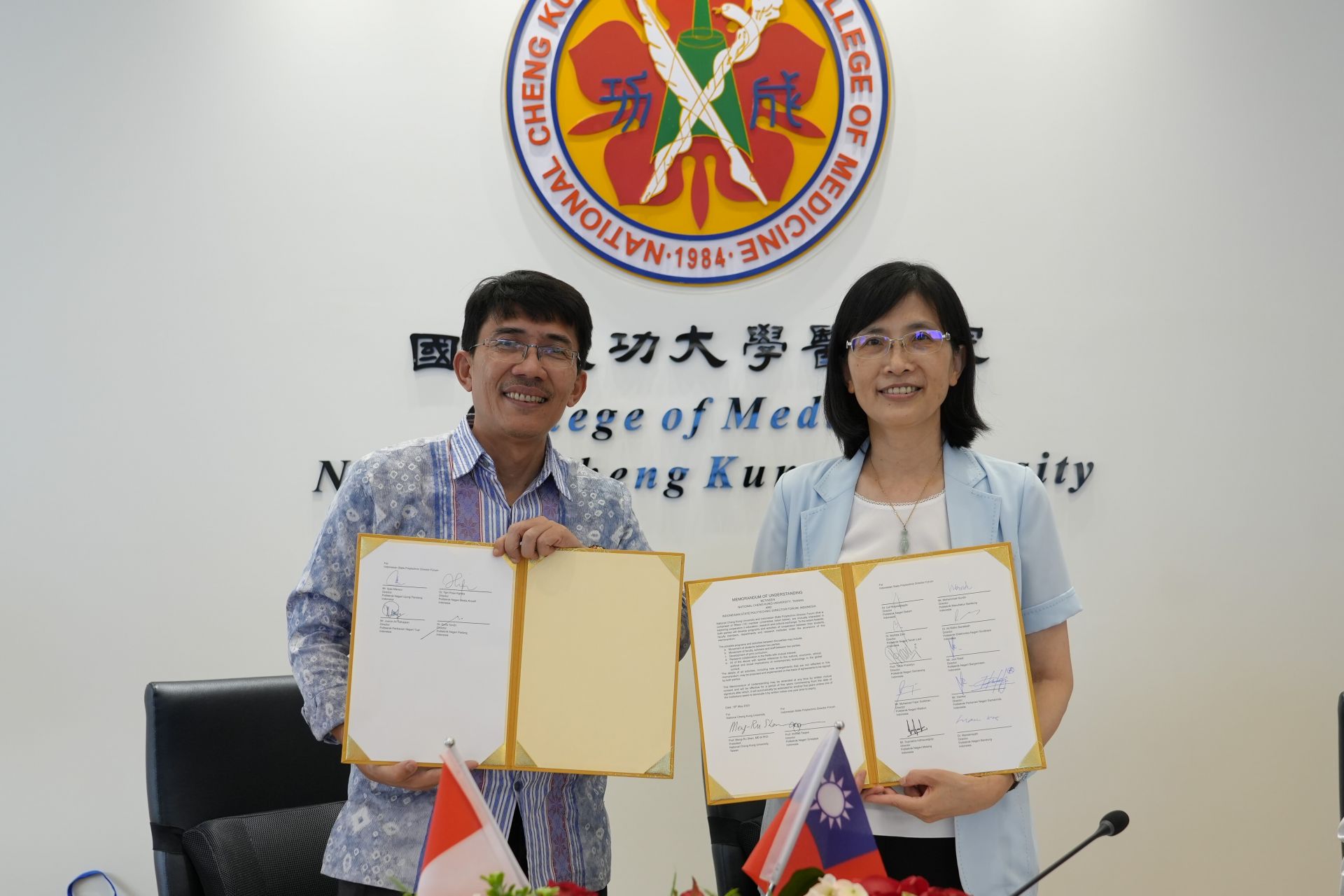SDG4
Kneron CEO Chun-Chen Liu Donates High-Performance AI Equipment in Return to Alma Mater, Supporting AI Education Development
Chun-Chen Liu, an outstanding young alumnus of National Cheng Kung University (Class of ’03 in the Department of Electrical Engineering) and founder & CEO of Kneron, adheres to his original intention of giving back to his alma mater. He generously donated three globally pioneering GPT-focused high-performance servers (KNEO 300) and Dongle devices (total value approximately NT$5 million) to the EE Department of NCKU, to assist in promoting AI teaching and research and nurturing more talent in the AI field. The donation ceremony was held on September 24 in the Ling-Yang Hall of the EE Department building.
In his speech, Chun-Chen Liu said that his learning experience at NCKU had a profound impact, and after entrepreneurship he was more grateful for the support of many seniors. Even though the company is still small in scale, he hopes to carry on the spirit of seniors giving back so that the department will continue to grow and strengthen. He noted that the advancement of AI technology is gradually reshaping the form of education. This intelligent learning environment not only can precisely meet the diversified learning needs of different students and significantly improve learning outcomes and quality, but also tangibly reduce the teaching burden on instructors, greatly increasing teaching efficiency and providing scientific and comprehensive bases for educational decision-making. He sincerely hopes to continue exploring the path of AI education so that technology truly serves human growth.
Associate Chair Chin-Lung Yang of the EE Department of NCKU represented the department to express gratitude. He said that while 2022 is regarded as the “Year One of AI,” Kneron invested in the field of artificial intelligence more than ten years ago with foresight, and boldly realized its entrepreneurial ideals. Now by giving back to the department, it shows a virtuous cycle and deep affection. He pointed out that this donation not only provides valuable R&D technical resources but also demonstrates the strong emotional connection alumni have to their department. These devices will be used in course instruction, interdisciplinary projects, and AI research initiatives. It is hoped that more outstanding AI talents who can implement theory in practice will be cultivated, contributing to technology and society as much as possible. He summarized in four characters “耐能成功” from “耐寒傲雪心志成,能忍萬難建奇功” to symbolize the hope that Kneron will successfully go public in the future and continue close cooperation with NCKU.
The donated KNEO 300 is equipped with high-performance computing capabilities supporting large language models (LLMs) and generative AI, assisting faculty and students in conducting innovative experiments in coursework, projects, and interdisciplinary applications. Through this advanced equipment, students can learn frontier AI technologies directly, moving from theory to practice, further enhancing their interdisciplinary collaboration and problem-solving capabilities. Meanwhile, Kneron is working together with its education outreach partner “Innovedus” so that the capabilities of these devices can extend to more teaching application scenarios. Innovedus has hosted the NCKU EE AI Freshman Interactive Workshop for three consecutive years, combining Kneron’s Edge AI technology to let students experience the power of AI inference through hands-on operation. Innovedus founder & CEO Wei-Cheng Zhou said that at the outset of the AI inference era, Kneron’s Edge AI will continue to help deepen educational promotion and launch industry–academia cooperation, helping NCKU’s outstanding talent seize future opportunities.
Alumnus Chun-Chen Liu previously shared his insights on AI development in the NCKU EE Forum on “Generative AI.” He pointed out that as data volumes grow explosively, latency in information transmission between endpoints and the cloud has become an urgent challenge, requiring real-time decision capability. The rise of ChatGPT proves that AI can undertake many knowledge-type tasks, but its model training must be carefully calibrated to avoid ideological bias and privacy leakage issues. Moreover, the large GPU compute demand not only causes cost burdens but also raises concerns about carbon emissions, posing challenges to the universality of AI. Liu emphasized that through the application of endpoint compute NPUs, latency and privacy issues can be simultaneously addressed, and edge computing can be realized at lower cost, promoting AI popularization and application.
In recent years, the government has actively promoted AI scientific research and system development, emphasizing the cultivation of AI talent. It hopes to consolidate Taiwan’s competitiveness in core AI technologies through linking education, R&D, and industry. The donated KNEO 300 and Dongle equipment provide strong native AI computational power, support Python / C++ development environments, and offer open-source project templates and official Kneron model support. They are applicable to AI education in universities and high schools, such as running real-time semantic segmentation models, robotic vision, etc. They break the traditional barrier of hardware–software compatibility and bring plug-and-play developer experience to many faculty and students. The introduction of KNEO 300 not only aligns with policy direction but will also become a key resource for the EE Department at NCKU to implement AI teaching and research. In the future, these resources will be broadly applied in data analysis, smart manufacturing, smart cities, and other fields, cultivating a new generation of AI talent with interdisciplinary thinking and a global perspective.
In his speech, Chun-Chen Liu said that his learning experience at NCKU had a profound impact, and after entrepreneurship he was more grateful for the support of many seniors. Even though the company is still small in scale, he hopes to carry on the spirit of seniors giving back so that the department will continue to grow and strengthen. He noted that the advancement of AI technology is gradually reshaping the form of education. This intelligent learning environment not only can precisely meet the diversified learning needs of different students and significantly improve learning outcomes and quality, but also tangibly reduce the teaching burden on instructors, greatly increasing teaching efficiency and providing scientific and comprehensive bases for educational decision-making. He sincerely hopes to continue exploring the path of AI education so that technology truly serves human growth.
Associate Chair Chin-Lung Yang of the EE Department of NCKU represented the department to express gratitude. He said that while 2022 is regarded as the “Year One of AI,” Kneron invested in the field of artificial intelligence more than ten years ago with foresight, and boldly realized its entrepreneurial ideals. Now by giving back to the department, it shows a virtuous cycle and deep affection. He pointed out that this donation not only provides valuable R&D technical resources but also demonstrates the strong emotional connection alumni have to their department. These devices will be used in course instruction, interdisciplinary projects, and AI research initiatives. It is hoped that more outstanding AI talents who can implement theory in practice will be cultivated, contributing to technology and society as much as possible. He summarized in four characters “耐能成功” from “耐寒傲雪心志成,能忍萬難建奇功” to symbolize the hope that Kneron will successfully go public in the future and continue close cooperation with NCKU.
The donated KNEO 300 is equipped with high-performance computing capabilities supporting large language models (LLMs) and generative AI, assisting faculty and students in conducting innovative experiments in coursework, projects, and interdisciplinary applications. Through this advanced equipment, students can learn frontier AI technologies directly, moving from theory to practice, further enhancing their interdisciplinary collaboration and problem-solving capabilities. Meanwhile, Kneron is working together with its education outreach partner “Innovedus” so that the capabilities of these devices can extend to more teaching application scenarios. Innovedus has hosted the NCKU EE AI Freshman Interactive Workshop for three consecutive years, combining Kneron’s Edge AI technology to let students experience the power of AI inference through hands-on operation. Innovedus founder & CEO Wei-Cheng Zhou said that at the outset of the AI inference era, Kneron’s Edge AI will continue to help deepen educational promotion and launch industry–academia cooperation, helping NCKU’s outstanding talent seize future opportunities.
Alumnus Chun-Chen Liu previously shared his insights on AI development in the NCKU EE Forum on “Generative AI.” He pointed out that as data volumes grow explosively, latency in information transmission between endpoints and the cloud has become an urgent challenge, requiring real-time decision capability. The rise of ChatGPT proves that AI can undertake many knowledge-type tasks, but its model training must be carefully calibrated to avoid ideological bias and privacy leakage issues. Moreover, the large GPU compute demand not only causes cost burdens but also raises concerns about carbon emissions, posing challenges to the universality of AI. Liu emphasized that through the application of endpoint compute NPUs, latency and privacy issues can be simultaneously addressed, and edge computing can be realized at lower cost, promoting AI popularization and application.
In recent years, the government has actively promoted AI scientific research and system development, emphasizing the cultivation of AI talent. It hopes to consolidate Taiwan’s competitiveness in core AI technologies through linking education, R&D, and industry. The donated KNEO 300 and Dongle equipment provide strong native AI computational power, support Python / C++ development environments, and offer open-source project templates and official Kneron model support. They are applicable to AI education in universities and high schools, such as running real-time semantic segmentation models, robotic vision, etc. They break the traditional barrier of hardware–software compatibility and bring plug-and-play developer experience to many faculty and students. The introduction of KNEO 300 not only aligns with policy direction but will also become a key resource for the EE Department at NCKU to implement AI teaching and research. In the future, these resources will be broadly applied in data analysis, smart manufacturing, smart cities, and other fields, cultivating a new generation of AI talent with interdisciplinary thinking and a global perspective.

Chun-Chen Liu Donates AI Equipment to Give Back to NCKU Department of Electrical Engineering

Liu Expresses Gratitude to His Alma Mater, Hopes to Carry On the Spirit of Giving Back

NCKU Department of Electrical Engineering Thanks Alumnus for Donation, Strengthening Research and Development Capacity

Group Photo





![[Phoenix Lecture] E.SUN Bank Chairman Joseph Huang on "Embracing Adversity and Building Organizational Resilience"](/userfiles/images/20240925030918425.jpg)
















